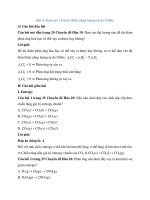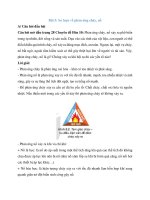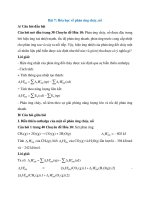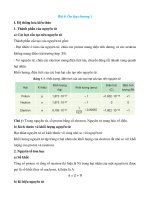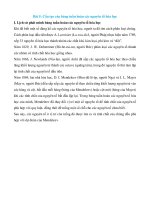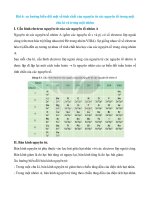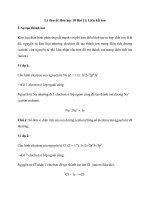De cuong va bai tap HKIAv 8
Bạn đang xem bản rút gọn của tài liệu. Xem và tải ngay bản đầy đủ của tài liệu tại đây (154.43 KB, 7 trang )
<span class='text_page_counter'>(1)</span><div class='page_container' data-page=1>
<b>REVISION FOR THE 1</b>
<b>st</b><b><sub> TERM</sub></b>
1.
<b>Present simple( Hiện tại đơn) :</b>
Ex -The earth goes around the sun.
PĐ: S + don’t/doesn’t + V(bare-inf.) ………..
-We don’t have classes on Sunday.
NV: Do/Does + S + V + ……….?
- Does Lan speak French?
<i>*Cách nhận biết: often, sometimes, usually, always, never, every( every day, every night...)</i>
2.
<b>Present progressive( Hiện tại tiếp diễn): </b>
<b>PĐ: S + am not/ isn’t/ aren’t + V-ing.</b>
<b>NV: Am/ Is/ Are + S + V-ing?- Yes, S + am/ is/ are</b>
<b> - No, S + am not/ isn’t, aren’t</b>
*Cách nhận biết: now, at the moment, at present, Look!, Listen!
*Note: S + am/ is/ are + getting + Adj( Adj-er/ more adj)- diễn tả sự thay đổi.
<i><b> becoming</b></i>
3.
<b>Simple future( Tương lai đơn) : </b>
4. Near Future: Be going to ( thì tương lai gần )
- Form : S + is / am/ are + going to + Vinf
Cách nhận biết: tomorrow, tonight, soon, next (next week, next month, next Sunday…).
<b> </b>
<i><b>5. Past Simple Tense (Thì quá khứ đơn)</b></i>
<i><b> Form:</b></i>
Ex : - He arrived here yesterday.
PĐ : S + didn’t + V + ……….
- She didn’t go to school yesterday.
NV: Did + S + V + ……… ? - Did you clean this table?
- Nhận biết:
<b>last </b>
week / month / year . . ., a week / 3 days / 5 months ago , yesterday,
<b>yesterday</b>
morning /
evening,
<b>In</b>
+ năm (1999/ 2009),
<b>from </b>
2000
<b>to</b>
2005
Note: - Cách đọc âm cuối “ ED”:
+ “ ED”: được đọc là /t/ khi những động từ nguyên mẫu có âm tận cùng là /f/, /k/, /p/, /s/,/t
/, /
/.
Ex : laughed , asked , helped , watch , pushed , dressed , ………
+ “ ED”: đươc đọc là /id/ khi những động từ nguyên mẫu có âm tận cùng là /d/ và /t/
Ex : needed , wanted , waited , ……..
+ “ ED”: đươc đọc là /d/ khi những động từ nguyên mẫu có âm tận cùng là các âm còn lại
Ex : enjoyed , saved , filled ,……….
Exercise: Put the verbs into columns according to their ending sound “ed”
HOPED – AGREED – RAISED – PRACTISED – STOPPED – PERMITTED – ADDED – STUDIED –
CRIED – COLLECTED – MISSED – LAUGHED- LEARNED- STAYED- LIVED- LIKED-
LOOKED-/t/
/id/
/d/
<i><b> 6. Present perfect tense( Thì hiện tại hoàn thành )</b></i>
Form:
PĐ: S + haven’t/ hasn’t + V-ed/ cột 3
NV: Have/ Has + S + V-ed/ cột 3?
<b>1.Verb tense</b>
<b>S + V(s/es)</b>
<b>S + am/is/are+V-ing</b>
<b>S + will + V-bare</b>
S + have/ has + V-ed/cột 3
S + V-ed/cột 2
</div>
<span class='text_page_counter'>(2)</span><div class='page_container' data-page=2>
* Nhận biết:
<b> For + khoảng thời gian(</b>
Chỉ thời gian kéo dài bao lâu.) Ex: You have studied English for 4 years.
<b> Since+ mốc thời gian(</b>
thời gian bắt đầu từ lúc nào ) Ex: She has studied English since 2003.
- already, just, recently, lately, not...yet, never, ever....
<b>Exercises:</b>
1.
They usually(play) __________ catch at recess.
2.
Does she always(skip) ________ rope after school?
3.
Look! Hung(jump) _________ in to the water.
4.
He(go) ________ to the movies tonight.
5.
What ______ you _________(do) next Sunday?
6.
Tomorrow, she(invite) ________ all friends to her birthday.
7.
My father (listen) ________ to the radio everyday.
8.
He (do) ___________ Math now.
9.
Jane (play) _______ the piano at present.
10.
Listen! The boy (play)_________ the guitar.
11.
Our friends (come) ________ here soon.
12.
I usually (go) ________ to school by bike, but tomorrow I (go) ________ to school by bus
13.
We (not/ invite) _________ many friends to the party tonight.
14.
She (come) to France two years ago.
15.
My computer (not work) since last week. .
16.
I (not eat) anything for two days
17.
English is Mr Jones. I (study) with him for six months.
18.
The Browns (be) in Vung Tau since last Sunday.
19.
I (know) her since I (work) here.
20.
They (move) to HCM city in 1990 and (live) there since then.
1.enjoy / practice / love / like / dislike/ hate/ finish...+ Ving
2Would you like
To learn + to –inf.
To want
To need/ to hope/ ....
3. Modal verbs ( can/ could/ should/ ought to/ must/ vill/ ..) + V(bare-inf)
4. Sau giới từ ( at/ in on/ about/ of/...) + V- ing
5. Used to + V (bare- inf) : diễn tả thói quen trong q khứ mà hơng còn ở hiện tại
6. Enough + to- inf.
Exercise:
1. Would you like (join) ______ our club?
2. My sister practices (play) __________ the violin once a week.
3. The children love (play) ____________ video games.
4. You can (find) ________ math books on the rack in the middle.
5. We are interested in (go) ______ to English club.
6. He enjoys (draw) ______ pictures.
7. Mai learns (play) _________ the piano in her free time.
8. Children shouldn’t (stay) __________ up late.
9. Let’s (go) _________ to the English club.
10. Why don’t you (invite) ___________ him?
11. What about (read) _______ in the library?
12. Hai likes(listen) to music in his free time.
13. She is good at(draw) ______ pictures.
14. After (do) her homework, Lan usually listens to the plays on the radio.
15. People used to (think) that the earth was flat.
</div>
<span class='text_page_counter'>(3)</span><div class='page_container' data-page=3>
16. Tom is old enough ( go ) to school.
myself, yourself, himself, herself, itself, ourselves, yourselves, themselves .
- Diễn tả hành động trở lại với chính người thực hiện .
+ Nó có thể làm túc từ (Object ) Ex: Be careful.. You’ll cut
<b>yourself.</b>
+ Nó đứng ngay sau từ mà nó làm mạnh nghĩa. Ex : He
<b>himself </b>
gave it to me.
<b>- </b>
Đại từ phản thân làm mạnh nghĩa cho chủ từ. Nó đứng ngay sau chủ từ, hoặc đứng ở cuối mệnh đề /câu. Ex:
Mary
<b>herself</b>
cleaned the floor.
Exercise:
1. Let’s paint the house ___________. It will be much cheaper.
2. Julia had a great holiday. She enjoyed ___________.
3. Don’t worry about Tom and me. We can look after ___________.
4. Who told you that Linda was getting married? – Linda told me ___________.
5. Be careful! That pan is very hot. Don’t burn ___________.
out side, inside, there, here, upstairs, downstairs ,next to ,under ,…………..
Ex: The money was finally found under the boards.
-
<b>AT : </b>
giờ, buổi trưa, ban đêm, dịp( at noon/ at 8.00/ at Christmas)
<b>- IN : tháng</b>
/năm / mùa/ buổi/thế kỷ ( in the morning/ in 1999)
<b>- ON: </b>
tháng + ngày/ ngày đặc biệt/thứ.. ( on May 1
st<sub>/ on Christmas Day/ on Monday)</sub>
<b>- FROM </b>
+ một điểm thời gian +
<b>TO </b>
+ một điểm thời gian
Ex: We have class from 7.00 to 10.15
-
<b> FOR: </b>
+ một khoảng thời gian : để nói rằng một cái gì đó diễn ra bao lâu rồi
Ex : We walked for 2 hours to reach the waterfall.
-BETWEEN+ điểm thời gian+ AND+ điểm thời gian.
Ex: I was at home between 7.00 and 9.00.
Exercise: Fill in the blanks with one suitable preposition
He asked me to come __________ 11:30, not __________ noon.
The stores open __________ Mondays until 9:00 p.m.
Is your birthday __________ April? – Mine is __________ April 7.
Call me again __________ 11 o’clock because my classes will finish __________ 11:00
You must be there __________ 2:00 and 2:30 p.m
Cách thành lập: Adj + ly = Adv
Beautiful - beautyfully
Happy - happily
Quick - quickly
* Note: hard - hard
Fast - fast
Good - well
<b> Form: S + ask + O + to- inf</b>
<b> tell not to-inf</b>
<b> advise</b>
Lời khuyên cịn có cấu trúc:S1+ said + (that) + S2 + Should/ shouldn’t+ V (bare-inf)
<b>3. </b>
<i><b>Reflexive pronouns.( Đại từ</b></i>
<i><b> phản </b></i>
<i><b>thân)</b></i>
<b>4. Adverbs of place(trạng từ dhỉ nơi chốn)</b>
<b>5. Preposition of time( giới từ chỉ thời gian)</b>
<b>6. Adverbs of manner( trạng từ chỉ thể cách)</b>
</div>
<span class='text_page_counter'>(4)</span><div class='page_container' data-page=4>
1.
<b> So sánh bằng</b>
- Dạng khẳng định:
<b> S + V + as + adj / adv + as + Noun</b>
Ex: Mai is as tall as Lan .
- Dạng phủ định:
<b>S + V + not + as / so + adj / adv + as + Noun </b>
Ex: Mai isn’t as/so tall as Lan
*.
<b> Similarity ( Sự tương đồng)</b>
:
<b> </b>
Để diễn tả sự tương đồng ,ta có thể dùng :
<b>- LIKE</b>
( giống, như )
Ex: He ‘s like his father.
-
<b> THE SAME AS</b>
( giống như )
Ex: Your shirt is the same as Ba’s.
-
<b> DIFFERENT FROM </b>
( khác với )
Ex: He’s different from his mother.
* Note :
<b> “THE SAME + noun + AS</b>
”cũng được dùng để diễn tả sự tương đồng hay bằng nhau.
Ex : He is the same age as my brother.
He’s as old as my brother.
2.
<b> So sánh hơn </b>
- Tính từ có một âm tiết :
<b>Adjective –er + than </b>
Ex: I’m stronger than you.
- Tính từ có hai âm tiết trở lên:
<b>More + adj +than</b>
Ex: My sister is more beautiful than me.
3
<b>So sánh hơn nhất</b>
-Tính từ có một âm tiết :
<b>The + Adj –est</b>
Ex: This tower is the tallest.
- Tính từ có hai âm tiết trở lên:
<b>The + most + adj </b>
Ex:Hoa is the most beautiful in my class
Note : Một số tính từ bất qui tắc
Good/well - better - the best
far - farther - the farthest
Bad/badly - worse - the worst
further - the furthest
1. S + be ( not) + Adj + to-inf : (khơng) đủ ....để làm gì
2. S + be( not) + Adj + for + O + to- inf: (khơng ) đủ....cho ai làm gì
3. It + be + Adj + to –inf : Thật là... để...
V-ing + be + Adj
4. Let’s + V-inf.... : chúng ta hãy...
5. Lời đề nghị/ lời yêu cầu.
Exercise:
1. The weather was beautiful. We can go camping.
The weather was___________________________________________________________________________
2. Huy wasn’t hard-working. He couldn’t get good grades.
Huy wasn’t________________________________________________________________________________
3. He can touch the light because he is very tall.
He is ____________________________________________________________________________________
4. The porter couldn’t carry this heavy suitcase because he was weak.
The porter wasn’t___________________________________________________________________________
5. The question is difficult. We can’t answer it.
The question is not__________________________________________________________________________
6. It’s easy to do this exercise.
Doing...
7. Playing soccer is interesting.
It’s...
8. Shall we put the lamp on the table?
Let’s...
9. I need a favor.
Could you...?
10. You should study hard.
You ought...
Bài tập tổng hợp
1. My friend always does his homework ………
a. careful b. carefully c. very careful d. careless
2. Did you help Lan do that exercise? _ No, she did it ……….
a. itself b. himself c. yourself d. herself
3. We have lived in Vung Tau ………1990.
<b>8 Comparison( so sánh)</b>
</div>
<span class='text_page_counter'>(5)</span><div class='page_container' data-page=5>
a. for b. in c. on d. since
4. ……….have you lived in this neighborhood? _For about five years.
a. When b. Where c. How long d. How
5. You have to put all dangerous objects out of children's ………
a. hands b. reach c. place d. reaches
6. I ……… on a farm when I was a young boy.
a. used to live b. used to livingc. use to live d. was living
7. Playing football and going camping are ………activities.
a. outside b. outdoor c. outdoors d. outer
8. I want to ……….this parcel to Nha Trang.
a. receive b. get c. send d. buy
9. It's too cold outside. ………you close the door, please?
a. Do b. Are c. Could d. Why don't
10. You can ………for the course next week.
a. write b. fill c. enroll d. send
11. I'm sorry my sister 's out. Would you like to………her a message?
a. let b.give c. make d. leave
12. We ………friends for four years.
a. have been b. are c. were d. will be
13 Which sentence is correct? ………? _ She's small, but very pretty.
a. What does she like? b. How does she look like?
c. What 's she look like? d. What does she look like?
14 Which sentence is differrent?
a. Do you need any help? b. Could you help me, please?
c. Could you do me a favour? d. Can you pick me up at 7.00 o'clock tonight?
15 This cake tastes………
a. terrible b. terribly c. badly d. well
16 John has lived in Paris ……….
a. last summer b. for last summerc. in last summer d. since last summer
17 Your weight is the same ………mine.
a. like b. as c. with d. to
18She told me ……….these books to her house.
a. to take b. take c. taking d. takes
19 You should work harder ………your English pronunciation.
a. on b. in c. at d. with
20. Both boys taught ………to swim.
a. himself b. ourselves c. themselves d. yourselves
21. Their children have quite ………characters.
a. different b. difference c. differently d. differences
22. The doctor advised him ………a rest and ………any heavy work.
a. to take/ to do b. to take/ not do c. takes/ doesn't do d. to take/ not to do
23. Ice-tea is ………Melon tea.
a. similar b. as c. differrent from d. the same
24. He came ………with a new idea for increasing sales.
a. in b. on c. up d. to
<i><b>II/ Supply the correct verb tense or form: (2pts)</b></i>
1. My father told me (not stay) up too late.
2. Would you like (go) to the cinema with me tonight?
3.Hoa (visit) her parents once a year.
4. Mai is still in her room. She (iron) her clothes for the next week.
5. The students often collect waste paper for (recycle).
6. They intend to move to Nha Trang, so they (sell) their house.
<i><b> Rewrite the sentences as directed in brackets: (3pts)</b></i>
1. His son is very intelligent. He can answer your difficult questions.(Combine; using "enough")
- His son...
</div>
<span class='text_page_counter'>(6)</span><div class='page_container' data-page=6>
4. He /used / stay/ uncle/ farm / summer. (make a complete sentence)
- He...
5."You should practice speaking English every day."the teacher said.(Using“Reported speech”)
- The teacher advised us...
6. The red pen is cheaper than the blue one._ The red pen isn't as…………...
<i><b>V/ Rewrite the sentences as directed in brackets: (3pts)</b></i>
1.Mai is fifteen years old. She can't ride a motorbike. (Combine; using "enough")
2.“Can you help me with my homework, Ba?” , said Nam . ( Using “Reported speech” )
3. He was very poor, but now he isn't. (Rewrite; using "used to")
4. He /work / factory / three years . (make a complete sentence; using the present perfect tense)
5. Binh is having a decaying tooth. (He should………)
6.Your hair is black; mine is black, too. (Rewrite; using "the same………")
<i><b>VI/ Rewrite the sentences as directed in brackets: (3pts)</b></i>
1. The old man isn't strong. He can't walk by himself. (Combine; using "enough")
2.“You should eat more fruit and vegetables, Hoa”, said the doctor.( Using “Reported speech”)
- The doctor said...
3. She is quite pretty, with straight black hair. (Make a question)
What...
4. Nga started to keep this dog four years ago. (Rewrite; using the present perfect tense)
Nga has...
5. He was born …………June 5th<sub> ……… 1995. (Fill in the blanks with the right prepositions)</sub>
6. Your bag is differrent from mine. - Your bag isn't the………...
<i><b>VII Read the dialouge carefully then answer the questions below: (2pts)</b></i>
Mrs Van: Hello. This is Sai Tourist Company.
Mrs Lan: Hello. Could I speak to Mr Thinh, please?
Mrs Van: I'm afraid he's out right now. Would you like to leave him a message?
Mrs Lan: Yes. I'm Mrs Lan. I want to have a trip to Singapore on June 28.
Can you tell him to call me after 9.00 am?
Mrs Van:What's your telephone number?
Mrs Lan: 098 2525252.
Mrs Van: Ok, Mrs Lan. I'll tell him when he 's back. Bye.
Mrs Lan: Thank you very much. Bye.
<i><b>Questions:</b></i>
1. Who are talking on the phone?
2. Who took the message?
3. Where does Mr Thinh work?
4. Write the message for Mr Thinh.
<i><b>VIIIRead the passage carefully then answer the questions below: (2pts)</b></i>
Every year people in many countries learn English. Some of them are young children. Others are teenagers. Many
are adults. Some learn at school, others study by themselves. A few learn English just by hearing the language, in films,
on television, in the office, or among their friends.Most people must work hard to learn another language.
Why do all these people learn English? It's not difficult to answer this question. Many boys and girls learn English
at school because it is one of their subjects. Many adults learn English because it is useful for their work. Teenagers often
learn English for their higher study, because some of their books are in English at the college or universities. Other people
learn English because they want to read newspapers or magazines in English.
<b>A. Answer True or False: (1pt)</b>
1. Many boys and girls learn English because they have to study their own language.
2. Many adults learn English because it helps them in their work.
3. English is a very popular language.
4. Most people learn English by themselves.
<i><b>B. Answer the questions: (1pt)</b></i>
1. Why do you learn English?
2. How can we learn English?
<i><b>IX/ Read the passage carefully then answer the questions below: (2pts)</b></i>
Lan is excited about the interesting activities she is going to do. The Y & Y is having a plan to help the
</div>
<span class='text_page_counter'>(7)</span><div class='page_container' data-page=7>
She hopes she can save natural resources and raise some money for her school Y & Y in these activities. She also
thinks about participating in either planting trees and flowers or helping the street children.
<i><b>Questions:</b></i>
1.Is Lan going to have interesting activities?
2.What will she do?
3.What will she send for recycling?
4.What does she hope in these activities?
</div>
<!--links-->
